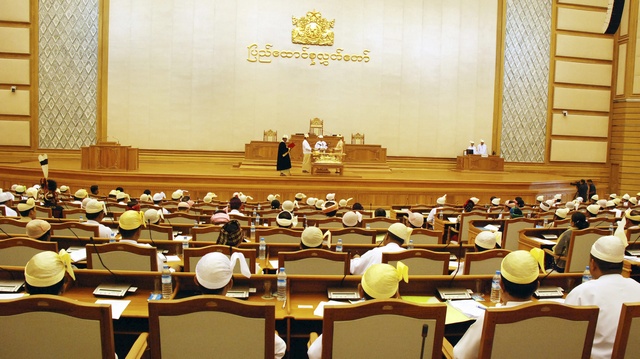The upper house of Burma’s Parliament has passed a proposal to recommend that the Union Election Commission (UEC) adopt a proportional representation (PR) voting system in future elections.
The proposal, which was the subject of debate in the upper house since Monday, was passed by standing vote – with 177 MPs in support, 85 against and three abstaining.
Khin Waing Kyi, upper house MP from the National Democratic Force party, who submitted the original proposal, said a commission will be formed to gauge different approaches in switch to a PR system from the currently employed first-past-the-post (FPTP) system.
“The upper house concluded – based on debate over the past three days – to bring together members of the parliamentary Bill Commission with representatives of the Union Election Commission to study proportional representation and discuss approaches which could be adopted in this new system,” said Khin Waing Kyi.
“The commission will then submit a report to parliament outlining its conclusions.”
She noted that among the supporters of her proposal were military MPs.
[related]
The Nationalities Brotherhood Federation (NBF), an alliance of 15 ethnic parties, on Tuesday publicly voiced their objection to a PR system, asserting that the system will allow major parties – those with sufficient resources to run campaigns nationwide –to seize seats from smaller, local ethnic parties. It said it would organise public protests to prevent such an electoral system being employed.
Aye Maung, upper house MP and deputy-chairman of the Arakan National Party, said that an attempt to switch to this new system may face public opposition.
“We believe that now is an inappropriate time to submit this proposal – it’s not fair to win by outnumbering smaller groups,” he said.
Aung San Suu Kyi’s National League for Democracy has also rejected the adoption of a PR system. However, the ruling Union Solidarity and Development Party, which has a majority in parliament, has thrown its support behind changing to PR.
The NDF originally submitted the PR proposal to the bicameral parliament last year via the UEC; however it was immediately rejected on the grounds that the approach was not in line with parliamentary procedures.
A similar proposal – to switch to the PR voting system – has also been submitted to the lower house and is scheduled to be discussed in parliament next week.
PR is designed to offer each party a proportional number of seats in parliament to the total number of votes its candidates receive. The alternative, an FPTP system, dictates that the winning candidate in each and every constituency wins that seat, and hence the parliament is ultimately made up of election winners, regardless of party affiliation.
The PR system was introduced in Europe in the mid-19th century to guarantee minority groups more representation than was possible under the FPTP or plurality system. Its supporters claim that it creates a more accurate reflection of public opinion; its opponents argue that by allowing more parties in a legislature, it may result in weaker, less stable governments.
The system is employed in many Western European countries, notably Germany, Spain, Netherlands, the Scandinavian nations and Russia. The USA, France and UK, however, use a FPTP system.



